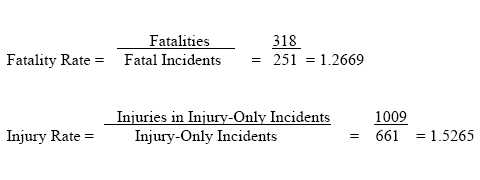WASHINGTON, DC – The Federal Railroad Administration (FRA), under the Department of Transportation (DOT) has issued an updated Nationwide Significant Risk Threshold (NSRT) and published it in the National Register on January 5, 2011.
 The announcement was made today at the Federal Register website:
The announcement was made today at the Federal Register website:
The article at the Federal Register website explains what the NSRT is:
The NSRT is an average of the risk indexes for gated public crossings nationwide where train horns are routinely sounded. FRA developed this risk index to serve as one threshold of permissible risk for quiet zones established under this rule across the nation.
This is the fifth time that the NSRT index has been updated since it was first established in 2006. Following is a table of the history of the NSRT Index and the dates that changes were made to it:
| Date | NSRT Index |
| August 17, 2006 | 17,030 |
| March 29, 2007 | 19,047 |
| May 28, 2008 | 17,610 |
| September 1, 2009 | 18,775 |
| December 29, 2010 | 14,007 |
| January 5, 2012 | 13,722 |
NSRT Formula
The following is the formula for calculating the NSRT:

NSRT Formula
Background and Purpose of the NSRT Index
The Federal Register website article describes the background of the NSRT Index and how local communities can use it in their calculations. The Federal Register article explains it thus:
Thus, a community that is trying to establish and/or maintain its quiet zone, pursuant to 49 CFR Part 222, can compare the Quiet Zone Risk Index calculated for its specific crossing corridor to the NSRT to determine whether sufficient measures have been taken to compensate for the excess risk that results from prohibiting routine sounding of the locomotive horn.
Please check the following article for a complete explanation of 49 CFR Part 222—USE OF LOCOMOTIVE HORNS AT PUBLIC HIGHWAY-RAIL GRADE CROSSINGS
FELA Lawyer News Blog is a FELA, train accident and personal injury blog that publishes up to date train accidents and FELA legal news from across the United States. The Federal Employers ‘Liability Act, (FELA) allows injured railroad workers to recover compensation based on the negligence of the railroad company, in lieu of workers’ compensation. FELA defines negligence as the railroad company’s failure to use reasonable care.